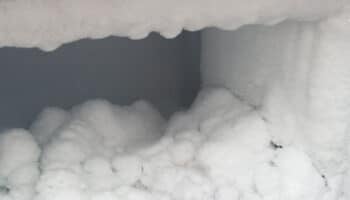Are you trying to figure out why your fridge smells like chemicals?
Unfortunately, this is a known issue. There’s nothing more annoying than opening the fridge to grab a snack only to find that it smells like chemicals.
Luckily, you’ve come to the right place to get this issue fixed.
If your refrigerator is smelling like chemicals, chances are your appliance is new, you used harsh chemical cleaners, or there’s spoiled food. Having a faulty condenser fan, dirty condenser coils or a Freon leak could also explain the issue.
Keep reading to learn how to fix these problems!
How to Fix a Refrigerator That Smells Like Chemicals: 6 Steps
You wouldn’t believe how many people I’ve seen complain about not being able to eat their food because it smells or tastes like chemicals.
I know how annoying it can be to have this happen. This is why I’ve prepared a list of the 6 different ways in which you can solve the issue.
Read on to get rid of the chemical smell!
#1 Wait for a Couple of Days
If you’ve recently bought your fridge, it may smell like chemicals.
You see, new fridges can smell like chemicals due to the plastic and other materials used in their construction.
Moreover, they can have a musty smell from their time sitting in the warehouse.
This is completely normal, and the only thing you can do is wait until the chemical smell airs out in a few days.
You can also try placing a bowl full of baking soda in your fridge. Baking soda helps absorb bad smells.
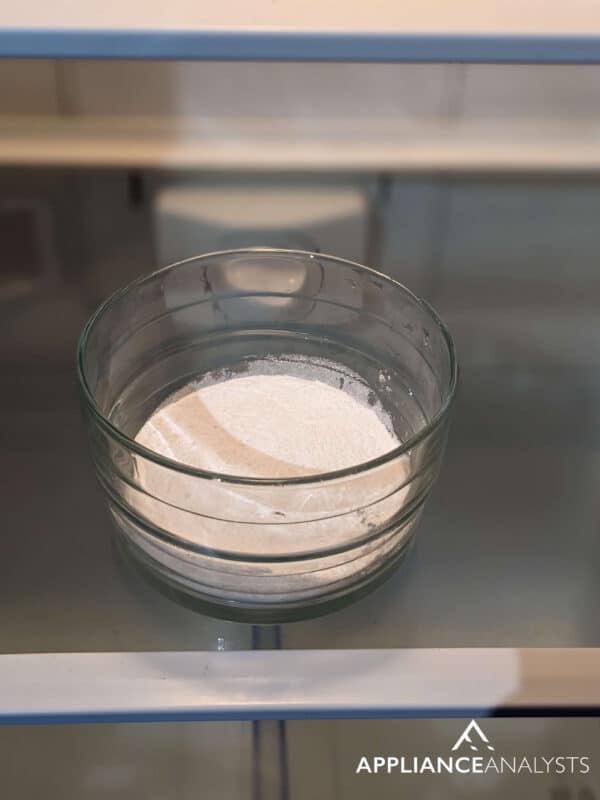
However, if it’s been over a week and your refrigerator still smells like chemicals, please keep reading.
#2 Use a Different Cleaning Product
Refrigerator interiors are usually made of plastic, which can easily absorb odors.
So, if you use chemical cleaners, you may want to start using a different cleaning product to keep your fridge from smelling like chemicals.
I always recommend making your own cleaning solution at home. You can mix water with vinegar and a few drops of lemon.
Using vinegar is a natural (and affordable) way to kill bacteria and get rid of bad odors.
#3 Check Your Fridge
If your fridge is still smelling like chemicals, chances are food is decomposing.
Don’t worry, this is completely normal and can happen to all of us. Some foods, such as citrus fruits, can smell like chemicals when they decay.

This is why you’ll need to check your fridge and remove any spoiled food.
Once you’ve done that, it’s time for us to deep clean your fridge to kill any bacteria and get rid of the odor.
Here’s how to do it:
- Take everything out, including shelves and food. You might want to transfer the highly perishable items to a cooler while cleaning the fridge.
- Get rid of any spoiled food.
- Fill a large bowl with diluted vinegar.
- Soak a soft sponge or cloth in the cleaning solution and wipe everything down. You may need to use a soft brush and hot water for stubborn stains.
- Don’t forget to clean the door seals and the exterior of your fridge.
- Dry your fridge to avoid mold and put everything back.
Tip: Do not place dairy products on your fridge door because this is the warmest place inside your appliance.
#4 Check the Condenser Fan
If you’ve cleaned your fridge, but it still smells like chemicals, you might want to check the condenser fan.
You see, this fan draws in the air over the condenser coils and exhausts hot air. Unfortunately, if it stops working, the temperature on your refrigerator will rise and cause bad smells.
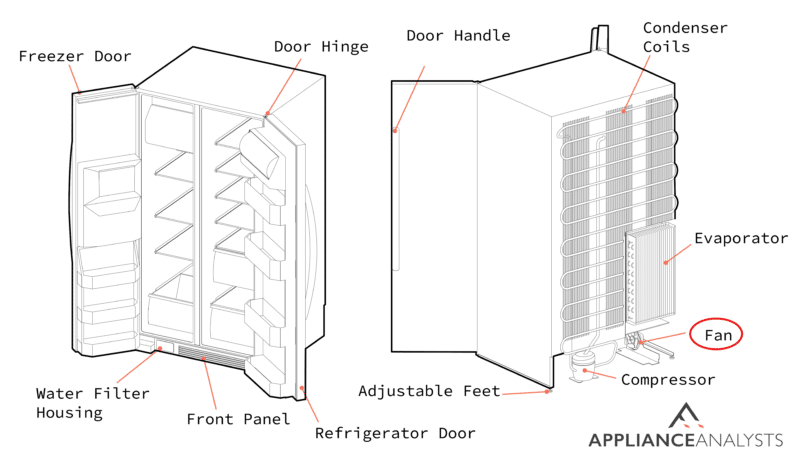
You can easily check if that’s the case by following these instructions:
- Unplug your fridge from the wall outlet and slide it away from the wall. You may need to ask a friend to help you.
- Remove the access panel on the back of the fridge. You may also need to remove a water intake line in the process.
- Check if there are any obstructions preventing the fan blades from spinning freely.
- If there’s nothing blocking the fan, there’s a good chance it’s damaged, and you need to replace it.
- To replace the fan motor, please unscrew it from its housing and remove it.
- Then, plug the new fan motor in and screw it back into the housing.
- Reattach the access panel and any other lines you had to remove.
- Slide your fridge back into place and plug it back in.
Bear in mind that the process above may vary depending on the brand and model you own. This is why I strongly recommend checking your manual for further instructions.
If you want to get any replacement part – or see how much one would cost – click to enter your model number in the search bar below. Our partners at AppliancePartsPros stock almost every part with free guides on how to install them.

#5 Clean the Condenser Coils
Moving on, it’s time for us to clean the condenser coils.
They are located on the bottom or back of your appliance and supply coolant throughout your fridge to keep temperatures low.
However, if they’re dirty, your fridge won’t work correctly, and it may smell bad.
Follow this quick guide to clean the condenser coils:
- Unplug your fridge from the wall outlet and let the condenser coils cool down.
- Carefully dust off the coils. You can use a clean cloth.
- Plug your fridge back into the wall outlet.
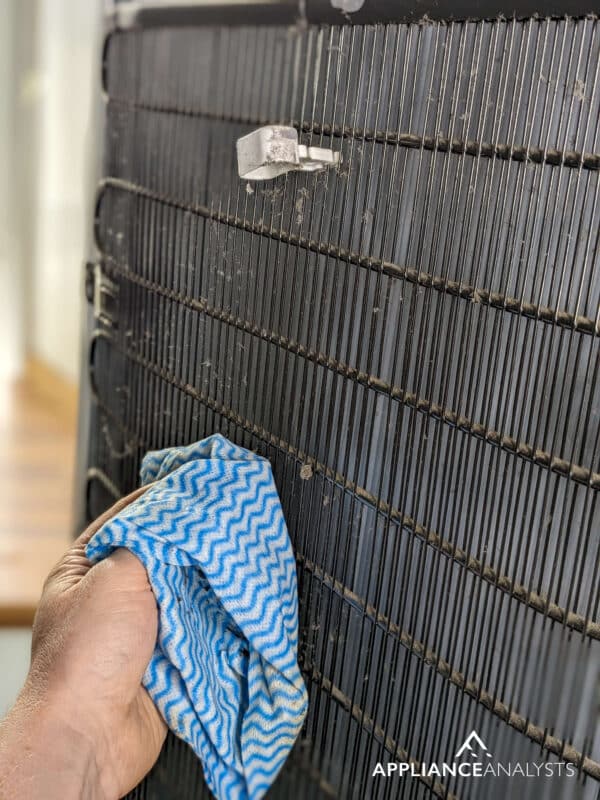
#6 Fix the Freon Leak
I hate to be the bearer of bad news, but if nothing has worked so far, you might have a Freon leak.
Freon is a colorless and tasteless gas used for heat transfer to keep your refrigerator and food at the correct temperature.
If you have a Freon leak, your refrigerator can smell like chemicals, your food will be warm, your electricity bill will increase, and you may have health issues (this gas can be harmful to your health and to the environment).
The Freon line is usually located at the back of the fridge behind the panel. It attaches to the compressor tank and feeds into the fridge.
To check if you have a Freon leak, you can do a visual inspection. If you find traces in the fridge system, that’s probably a leakage point.
However, since Freon is a delicate material that can be harmful to your health, I recommend calling a professional.
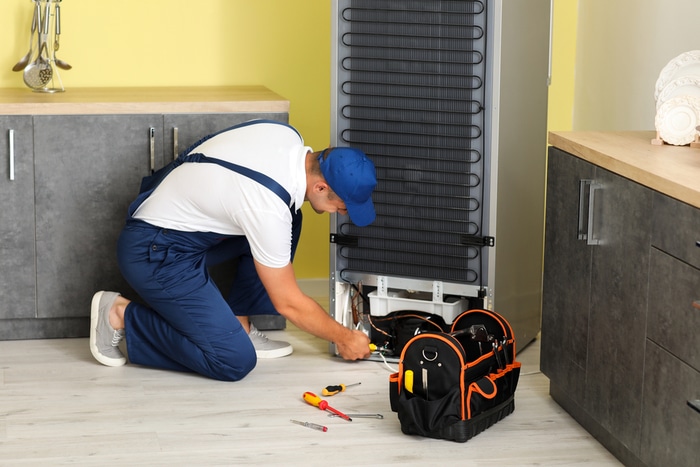
They’ll probably do a fluorescent, gas pressure, or electronic leak detection. The latter is one of the most famous methods, since it is one of the faster and most accurate ways to detect a leak.
The certified technician will seal the coolant pipes and probably replace the Freon that has leaked. Bear in mind that this may cost more than $200 USD.
This is why I recommend checking your manufacturer’s warranty policy. Most manufacturers offer one or two years of coverage that includes repairs and replacements.
You’ll find this information in the product documentation you received the day you bought your fridge. But, if you don’t have this paperwork, you can check the model of your appliance and access the manufacturer’s website to verify the length of the warranty.
You can also contact the retailer, because they typically save customer transaction details, so they can help you know more details about your warranty.
Finding Your Fridge’s Model Number and Manual
Whether you’re trying to fix the issue on your own or you want to call a professional, you may need to check your fridge’s manual.
If you can’t find it, I recommend looking for a label on the door, sides, or bottom of your fridge. This label usually contains the model number.
Then, go to Google and search for the brand and model number. For example, if you have a Samsung refrigerator, type “Samsung [model] Refrigerator Manual PDF”.
Then, download the manual and check if there’s a service repair phone.
Conclusion
I hope that now that we’ve covered everything, you’ll be able to solve the issue in no time.
If you take anything away, please remember that if your refrigerator is smelling like chemicals, and it’s new, you’ll need to wait for a couple of days.
But if your fridge isn’t new, don’t forget to remove any spoiled foods and clean your appliance with vinegar. Moreover, you’ll need to make sure the condenser fan is working correctly and check if there’s a Freon leak.
Thank you so much for taking the time to read this article. If you found the six fixes above helpful, please check out our related content below.
Have a great rest of the day!






